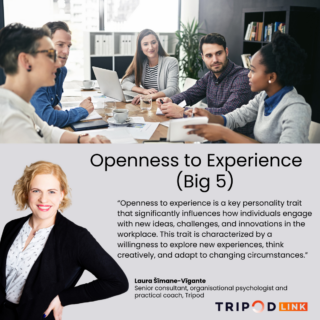
Emotional stability or the other dimension of the same scale – Neuroticism – is usually THE trait of the candidate that employers are interested the most. Assessing a candidate’s emotional stability is crucial because it indicates their ability to handle stress, adapt to change, and maintain professionalism in challenging situations. This ensures that they can remain productive under pressure, which is essential for long-term success in any role.
High emotional stability means the ability to control one’s emotional response, hence, the employee is able not to react emotionally to rejections or ignorance from clients, not so positive feedback from employers and co-workers. An emotionally stable employee can hear everyone out and take it as a learning experience. They use the feedback that they find necessary to improve their performance and just simply let go of the things that they don’t agree with. They are rational through and through in every situation, even in the most stressful ones. Emotionally stable people often have a particular kind of self-expression, they talk slowly, carefully choose their words, use even different kind of vocabulary. For example, if your candidate uses phrases like “rationally thinking”, “let’s stay calm or constructive” and can keep their hands and posture still without fidgeting and constantly moving, they most likely are highly emotionally stable. Sounds like a very desirable employee for sure.
But what to do with the rest of them? The ones who are low on Emotional Stability and high on Neuroticism? As much as we all would prefer to be highly emotionally stable, the world is full of people who are offended or even deeply hurt after receiving negative feedback, who cannot stay emotionless in stressful situations, who need to be liked by everyone, even when fully aware that this is impossible. People high on Neuroticism take their “job home” and sometimes have trouble sleeping because they are thinking of something that was not done right. They notice the mood of a colleague of theirs and may believe that they are accountable for it. Even without any evidence, the feeling of “something not being right” is haunting at times and needs to be fixed. People with low Emotional Stability do not like uncertainty or unpredictability. Employees can be influenced by difficult situations at home, which are out of their control and the fight, flight or freeze reaction can get in the way of productivity at times. Neurotic people are not built for direct confrontations and giving and receiving negative feedback can become a real problem.
So can we conclude that people who score low on Emotional Stability and high on Neuroticism not fit for the job market at all? Of course – no! They have many advantages – they can sense the emotional temperature in the room. No complaint from either a colleague or client will be overlooked. Also, although personality traits have a biological base, Emotional Stability can be “trained” and increased. With experience we learn to distinguish between what deserves to be concerned about and what we cannot change, so just let it be. Remember – there are no bad personality traits!
To sum it up, assessing Emotional Stability is crucial because it determines a candidate’s ability to handle stress, adapt to change, and maintain professionalism, making them highly desirable employees. While emotionally stable individuals excel in rationality and calm communication, those high on Neuroticism, despite struggling with stress and feedback, bring valuable emotional sensitivity to the workplace. With time and experience, Emotional Stability can be developed, reinforcing the idea that no personality trait is inherently bad, as each offers unique strengths that can be seen as the unique power skill of the employee.







